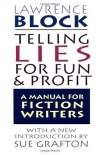Manual For Fiction Writers by Block, Lawrence (classic books to read .TXT) 📗

Book online «Manual For Fiction Writers by Block, Lawrence (classic books to read .TXT) 📗». Author Block, Lawrence
Other writers regard revision as a chore, and an unpleasant chore at that, but they seem to accept it as an inescapable part of the game. In the first draft, one is given to understand, the writer simply tries to get it down on paper. The second draft realigns the plot, smooths out inconsistencies of character, and otherwise gets the writer's ducks in a row. In the third draft scenes are restructured, plot and character refined. In the fourth, paragraphs and sentences are hammered into shape, dialogue is sharpened, commas are dropped here and inserted there. And, sooner or later, the abominable first draft emerges transformed into something divine and imperishable.
The late Jacqueline Susann frequently told television audiences how she rewrote every book four or five times, using yellow paper for one draft, green for another, pink for a third, blue for a fourth, and finally producing finished copy on white bond. I don't seem to recall what the point of this rainbow approach to revision may have been, nor am I sure I believe Susann actually did this; anyone as good as she at self-promotion might well have been capable of embroidery.
But that hardly matters. What's relevant, I think, is that Susann knew her audience. The public evidently likes the idea of reading books over which writers have labored endlessly. Perhaps it's somehow galling to shell out upwards of eight ninety-five for a book that flowed from its author's typewriter like water from a cleft rock. The stuff's supposed to read as though it came naturally and effortlessly, but one wants to be assured that a soul-satisfying amount of hard work went into it.
Well, the public be damned. The same public goes to prizefights to see boxers flattened and attends auto races hoping desperately to witness a crash. If they want hard work from writers, well, we can tell them we sweated our tails off. But do we actually have to rewrite our books and stories over and over?
There is, let it be said, a persuasive argument against rewriting. It can be advanced in either of two ways, depending whether one's approach is that of the artiste or the cynic.
The former might hold that a piece of creative work should indeed be all of a piece, that its artistic integrity is in part a function of the artist's mood at the moment of creation, that the verve and passion involved in writing could only be diluted by rewriting. Jack Kerouac took a position along these lines, explaining that he was trying to create a spontaneous bop prosody that amounted to a novelist's equivalent of a jazz musician's creative improvisation. This approach seems to have worked for Kerouac better in some books than in others?I found it generally effective in The Subterraneans, less so elsewhere?and I'm willing to entertain the hypothesis that the man's novels would have been watered down rather than spruced up by another trip or two through their author's typewriter.
A cynical rendition of the same argument may be found in a novel about a hack science-fiction writer who is enormously contemptuous of his own work and of the people who read it. He never rewrites anything, we are informed, because he knows revision would rob his crap of the only thing it has going for it, its freshness. Once you start rewriting, he argues, you're not able to stop. With each draft the fundamental banality and worthlessness of the material becomes more evident even as its vitality and spontaneity are drained from it. All you wind up doing is what William Goldman, discussing in The Season the agony of restructuring and rewriting an inadequate play prior to its opening, called washing garbage.
Personally, I've always detested rewriting. When once I get to the end of a piece of work, whether it's a quickie short-short or a ten-pound novel, I bloody well feel finished. When I write The End, I mean it.
Years ago I hardly ever did any rewriting. I was churning out appalling quantities of pulp novels and my first drafts were publishable as they stood. I had enough natural facility so that my prose and dialogue got by. Plot and characterization barely existed in these books, so revision wasn't necessary to rectify inconsistencies in those departments.
My attitude at the time was a cavalier one. I never rewrite, I was apt to say, because I make it a point to get it right the first time around. It does seem easier that way.
Ah, the brashness of youth. I'm older now, and a shade less arrogant, and the books and stories I write come less like the torrents of spring and more like molasses in January. They are more ambitious and they take a good deal more of my time.
And they involve considerably more rewriting than they used to.
But I still don't enjoy the process. And I still try to get it right the first time around. Because, all things considered, it still seems easier that way.
Unless you're one of those souls who was born to rewrite, you'd probably prefer to spend less time redoing your work and more time writing new things?or working in the garden, or watching sunsets, or whatever. Toward that end, let me offer a hint or two.
1. DON'T TAKE REWRITING FOR GRANTED. It may very well be that everything you ever publish will make





Comments (0)